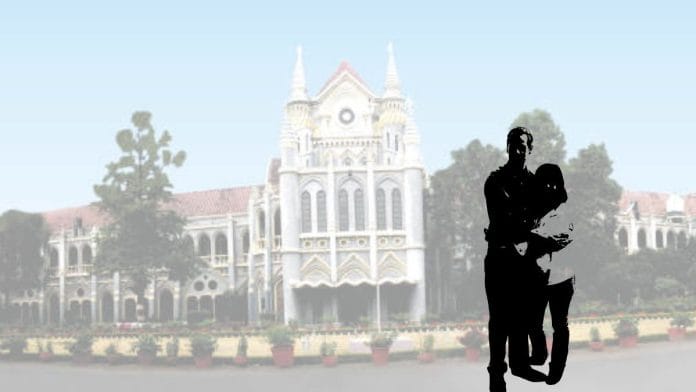New Delhi: Underlining that physical relations are a prerequisite for adultery, the Madhya Pradesh High Court has ruled that merely a wife’s love and affection towards another person cannot be sufficient to hold that she is living in adultery.
A bench of Justice G.S. Ahluwalia ruled that, “adultery necessarily means sexual intercourse” and, therefore, the petitioner’s contention that his wife was not entitled to maintenance because she was having an affair with someone else was “misconceived”.
“From Section 144(5) of the BNSS/125(4) of the Cr.P.C. it is clear that only if the wife is proved to be living in adultery, then the maintenance amount can be denied,” the court said.
Under Section 144 of the Bharatiya Nagarik Suraksha Sanhita (BNSS), which is analogous to Section 125(4) of the erstwhile Code of Criminal Procedure (CrPC), a magistrate can order maintenance of wives, children and parents.
However, Section 144(5) states this can be cancelled if it is proved that the wife, in whose favour such an order was made, “is living in adultery, refuses to live with her husband “without sufficient reason”, or is living separately by mutual consent.
Also Read: Sahib Bibi Aur Ghulam took on adultery way before Supreme Court did
What was the case
In the present case, the petitioner—who claimed to be a ward boy with a salary of Rs 8,000—approached the Madhya Pradesh HC against an order passed by the family court in April 2024, directing him to pay an interim maintenance of Rs 4,000 to his wife.
Although the question of paying maintenance usually comes up in divorce cases, the Madhya Pradesh HC order did not specify if this was a case of divorce.
In his plea, the man said that his wife was already getting maintenance under Section 24 of the Hindu Marriage Act, 1955. The section deals with maintenance and allows for interim or temporary relief to the spouse who has no means to maintain themselves or cover their costs of litigation.
The man also presented his salary certificate before the court to prove that he was not earning enough to cover the costs of maintenance, but the certificate was rejected by the court because of missing vital details, such as the date and place of issuance.
The petitioner also placed before the court a personal diary belonging to the wife, claiming that it was clear from its content that she was having an affair.
How does the law define adultery
Earlier, adultery was criminalised under Section 497 of the erstwhile Indian Penal Code, and a man guilty of sleeping with another’s wife could be punished by up to five years in prison.
However, women and married men who engaged in an affair with unmarried women could not be prosecuted under this offence. In 2018, a five-judge bench of the Supreme Court decriminalised the offence of adultery in Joseph Shine vs. Union of India.
Taking note of this judgment, the offence of adultery was removed from the statute books once the Bharatiya Nyaya Sanhita (BNS) and BNSS came out in 2023.
But adultery can still be a ground for divorce. Moreover, Section 125(4) of the CrPC, which is now Section 144 (5) of the BNS, also includes provisions exempting maintenance payments to the wife if she was guilty of extramarital sex.
What the court said
In its eight-page ruling on 15 January, relying on the 2021 Supreme Court ruling in Rajnesh vs. Neha, the Madhya Pradesh HC noted that since the ward boy didn’t contest that he was an “able-bodied person,” his meagre income could not be a justification for denying his wife maintenance. Observing that the man was well aware that he wasn’t competent to fulfil his own needs, the court noted that he was responsible for earning something to maintain his wife. The court also added that before the marriage, false information about the man’s properties and land was given to the wife.
The court also rejected the allegations of adultery, saying that he was using it as grounds to avoid paying maintenance. “So far as the contention of the counsel for the applicant that since the wife of the applicant has a love affair with somebody else, therefore, she is not entitled for maintenance is concerned, the said submission is misconceived.”
Then, dismissing the present plea, the court proceeded to uphold the maintenance ordered by the family court last year.






